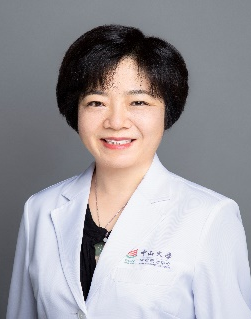- Name: Jiang Li
- Title: Professor and Doctoral Supervisor
- Email: lijiang@sysucc.org.cn
- Phone: (+86-20) 87342322
Prof. Jiang Li currently serves as a professor and doctoral supervisor in Biotherapy Research Center in Cancer Center of Sun Yat-sen University. After graduation from Chongqing University of Medicine in 1992, majoring in clinical medicine, Prof. Li got her Ph.D. at Sun Yat-sen University in 2002, after which she completed her further studies in Microorganisms and Oncotherapy Center in Karolinska Institute in Sweden and Cell and Gene Therapy Center in Baylor University in the USA respectively.
Prof. Li has presided over 6 major research projects of the National Natural Science Foundation of China and provincial and ministerial levels, participated in several major national research and development projects as a backbone, and published high-level academic papers in several SCI professional core journals as both first and correspondent author, including JCI, JAMA Network Open, Cell death & Differentiation, JITC etc. She also serves as a member of the special committee of many academic societies such as tumor biotherapy, tumor exosome research, and anti-cancer association.
With great interest in immune escape of tumor microenvironment (TME) and T-cell-based adoptive immunotherapy for solid tumors, since 2004, Prof. Li has been engaged in research focusing on immune tolerance of TME in EBV-positive nasopharyngeal carcinoma (NPC) and differentiation, functional characteristics, clinical correlation and regulatory mechanism of different subsets of tumor infiltrating immune cells such as Treg, Th17 and MDSC cells.
Furthermore, the role of tumor-derived exosomes in immunoregulation in TME (especially T cells), the regulatory mechanism between tumor metabolism and immune escape in NPC, and the development and establishment of TIL immunotherapy, are also the main research directions in her lab now.
Prof. Li jointly presided over phase I and II clinical trials of autologous TIL immunotherapy in NPC patients, and phase I clinical trials in patients with lung, bowel and cervical cancer.
1987-1992 B.M. Chongqing University of Medicine, China
1992-1995 M.M. Sun Yat-Sen University
1999-2002 Ph.D. Sun Yat-Sen University
2004-2005. Visiting Scholar Karolinska Institutet, Stockholm, Sweden
2008-2010 Postdoc Baylor College of Medicine, Houston, USA
1. Xu JX, Zhang R, Huang DJ, Tang Y, Ping LQ, Huang BJ, Huang HQ, Busson P, Li J. Galectin-9 Facilitates Epstein-Barr Virus Latent Infection and Lymphomagenesis in Human B Cells. Microbiol Spectrk, 11(1) , 2023
2. Li H, Cao D, Li S, Chen B, Zhang Y, Zhu Y, Luo C, Lin W, Huang W, Ruan G, Zhang R, Li J, Liu L. Synergistic Association of Hepatitis B Surface Antigen and Plasma Epstein-Barr Virus DNA Load on Distant Metastasis in Patients With Nasopharyngeal Carcinoma. JAMA Netw Open, 6(2), 2023
3. Huang H, Nie C, Liu XF, Song B, Yue JH, Xu J, He J, Li K, Feng YL, Wan T, Zheng M, Zhang Y, Ye WJ, Li JD, Li YF, Li JY, Cao XP, Liu ZM, Zhang XS, Liu Q, Zhang X, Liu JH, Li J. Phase I study of adjuvant immunotherapy with autologous tumor-infiltrating lymphocytes in locally advanced cervical cancer. J Clin Invest, 2022
4. Ni H, Zhang H, Li L, Huang H, Guo H, Zhang L, Li C, Xu JX, Nie CP, Li K, Zhang X, Xia X, Li J. T cell-intrinsic STING signaling promotes regulatory T cell induction and immunosuppression by upregulating FOXP3 transcription in cervical cancer. J Immunother Cancer, 10(9), 2022
5. Chuan-xia Zhang#, Shu-biao Ye#, Jian-jiao Ni#, Ting-ting Cai1, Yi-na Liu, Dai-jia Huang, Hai-qiang Mai, Qiu-yan Chen, Jia He, Xiao-shi Zhang, Yi-xin Zeng*, Jiang Li*, Jun Cui* STING signaling remodels the tumor microenvironment by antagonizing myeloid-derived suppressor cell expansion. Cell Death & Differentiation
6. Cai TT, Ye SB, Liu YN, He J, Chen QY, Mai HQ, Zhang CX, Cui J, Zhang XS, Busson P, Zeng YX, Li J. LMP1-mediated glycolysis induces myeloid-derived suppressor cell expansion in nasopharyngeal carcinoma. PLoS Pathog, 13(7), 2017
7. Ye SB, Zhang H, Cai TT, Liu YN, Ni JJ, He J, Peng JY, Chen QY, Mo HY, Jun-Cui,Zhang XS, Zeng YX, Li J. Exosomal miR-24-3p impedes T-cell function by targeting FGF11 and serves as a potential prognostic biomarker for nasopharyngealcarcinoma. J Pathol, 2016
8. Zhang H, Ye YL, Li MX, Ye SB, Huang WR, Cai TT, He J, Peng JY, Duan TH, Cui J, Zhang XS, Zhou FJ, Wang RF*, Li J*. CXCL2/MIF-CXCR2 signaling promotes the recruitment of myeloid-derived suppressor cells and is correlated with prognosis in bladder cancer. Oncogene, 2016
9. Zhang H, Li ZL, Ye SB, Ouyang LY, Chen YS, He J, Huang HQ, Zeng YX, Zhang XS, Li J. Myeloid-derived suppressor cells inhibit T cell proliferation in human extranodal NK/T cell lymphoma: a novel prognostic indicator. Cancer Immunol Immunother, 64(12), 2015
10. Li ZL, Ye SB, OuYang LY, Zhang H, Chen YS, He J, Chen QY, Qian CN, Zhang XS, Cui J, Zeng YX, Li J. COX-2 promotes metastasis in nasopharyngeal carcinoma by mediating interactions between cancer cells and myeloid-derived suppressor cells. Oncoimmunology, 4(11), 2015
11. Li J#, Chen QY#, He J, Li ZL, Tang XF, Chen SP, Xie CM, Li YQ, Huang LX, Ye SB, Ke ML, Tang LQ, Liu H, Zhang L, Guo SS, Xia JC, Zhang XS, Zheng LM, Guo X, Qian CN, Mai HQ*, Zeng YX*.Phase I Trial of Adoptively Transferred Tumor-infiltrating Lymphocyte Immunotherapy Following ConcurrentChemoradiotherapy in Patients with Locoregionally Advanced Nasopharyngeal Carcinoma. Oncoimmunology, 2(4), 2015
12. Zhang YL#, Li J#, Mo HY, Qiu F, Zheng LM, Qian CN, Zeng YX*. Different subsets of tumor infiltrating lymphocytes correlate with NPC progression in different ways. Mol Cancer, 9: 4, 2010

